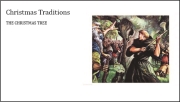 Legend has it the origins of the Christmas Tree tradition begins nearly 1,300 years ago in central Germany. Before we get there, however, we must start our story a few decades earlier in a British manor outside London, England. Young Winfrid, against the objection of his parents, entered a Benedictine monastery where he studied the Scriptures and grew in intellect, holiness and piety. After reading of the adventures of monks who had brought Christianity to his island home a century before, Winfrid longed to become a missionary himself. He journeyed to Rome to obtain the permission of Pope Gregory II. So delighted was the Pope with the young man’s fire for the gospel, he not only granted Winfrid his permission, but changed his name as well to the better known Boniface.
Legend has it the origins of the Christmas Tree tradition begins nearly 1,300 years ago in central Germany. Before we get there, however, we must start our story a few decades earlier in a British manor outside London, England. Young Winfrid, against the objection of his parents, entered a Benedictine monastery where he studied the Scriptures and grew in intellect, holiness and piety. After reading of the adventures of monks who had brought Christianity to his island home a century before, Winfrid longed to become a missionary himself. He journeyed to Rome to obtain the permission of Pope Gregory II. So delighted was the Pope with the young man’s fire for the gospel, he not only granted Winfrid his permission, but changed his name as well to the better known Boniface.
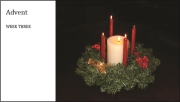 While the return of Jesus could have happened at any point in history, it has never been so likely as it is to happen in the next year. This could very well be the believer’s last Christmas on earth. With that understanding this season should inspire us all the more to live rightly, make amends where necessary and prepare oneself to humbly enter the presence of the King of kings and Lord or lords.
While the return of Jesus could have happened at any point in history, it has never been so likely as it is to happen in the next year. This could very well be the believer’s last Christmas on earth. With that understanding this season should inspire us all the more to live rightly, make amends where necessary and prepare oneself to humbly enter the presence of the King of kings and Lord or lords.
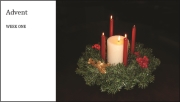 Today begins the season of Advent, a four week celebration of the first coming of the Messiah as Christ-followers eagerly await the second coming. In a way it is the Christian version of the Jewish holiday Sukkot, or Feast of Tabernacles, which depicts the time when God will dwell with Men once more. Celebrated mostly by the liturgical churches of the world, there is a great benefit in understanding and celebrating this tradition even for evangelicals. The season begins on the fourth Sunday before Christmas and begins the liturgical New Year in western churches.
Today begins the season of Advent, a four week celebration of the first coming of the Messiah as Christ-followers eagerly await the second coming. In a way it is the Christian version of the Jewish holiday Sukkot, or Feast of Tabernacles, which depicts the time when God will dwell with Men once more. Celebrated mostly by the liturgical churches of the world, there is a great benefit in understanding and celebrating this tradition even for evangelicals. The season begins on the fourth Sunday before Christmas and begins the liturgical New Year in western churches.
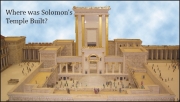 Back on October 23 of this year I made a passing reference to the location of the temple in Jesus’ day and hinted that it might not be where we have been thinking for a good many hundreds of years. Before too much time passes I want to address this issue, and especially as it has some bearing on other issues to be discussed this holiday season. Of all the articles we’ve posted here on Think-Biblically.com this is one you will probably want to bookmark.
Back on October 23 of this year I made a passing reference to the location of the temple in Jesus’ day and hinted that it might not be where we have been thinking for a good many hundreds of years. Before too much time passes I want to address this issue, and especially as it has some bearing on other issues to be discussed this holiday season. Of all the articles we’ve posted here on Think-Biblically.com this is one you will probably want to bookmark.
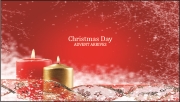 Of all the things you have learned about our savior and of our place in his kingdom over the last few weeks, nothing is more important than our full acceptance of the person celebrated today. Jesus came into this world as an infant, grew up with all the same emotions and temptations we have faced, and battled our darkness and the darkness in the heavenly places for a single purpose. To suffer and die at our hands and the hands of God’s enemies. Through his perfect birth, life, sacrifice and resurrection we have the chance to be made whole. Being complete means more than being independent of our sin, it means being in right relationship with the one who has loved us since before we were born. Mankind is not whole until he can enter the presence of God without fear.
Of all the things you have learned about our savior and of our place in his kingdom over the last few weeks, nothing is more important than our full acceptance of the person celebrated today. Jesus came into this world as an infant, grew up with all the same emotions and temptations we have faced, and battled our darkness and the darkness in the heavenly places for a single purpose. To suffer and die at our hands and the hands of God’s enemies. Through his perfect birth, life, sacrifice and resurrection we have the chance to be made whole. Being complete means more than being independent of our sin, it means being in right relationship with the one who has loved us since before we were born. Mankind is not whole until he can enter the presence of God without fear.
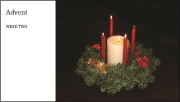 Next Sunday begins the second week of Advent. Each week is designed to move the believer to a place of expectancy. The Messiah came into this world once which ought to solidify our faith in his return. The readings are also intended to invoke a spirit of anticipation, for while the Messiah returns as Judge we are assured of our escaping judgment through our faith in Him. Finally, the season as a whole is to move us to a place of preparation, preparing our lives and our being for the joyous return of our God and savior Jesus.
Next Sunday begins the second week of Advent. Each week is designed to move the believer to a place of expectancy. The Messiah came into this world once which ought to solidify our faith in his return. The readings are also intended to invoke a spirit of anticipation, for while the Messiah returns as Judge we are assured of our escaping judgment through our faith in Him. Finally, the season as a whole is to move us to a place of preparation, preparing our lives and our being for the joyous return of our God and savior Jesus.
 Today American’s celebrate Thanksgiving, which is not a Biblical holiday but is a spiritual one for Christian-Americans. In order to learn how to celebrate this holiday as its framers intended, I’ve reprinted here the 1782 Continental Congress Proclamation, The historical document establishing Thanksgiving a national holiday:
Today American’s celebrate Thanksgiving, which is not a Biblical holiday but is a spiritual one for Christian-Americans. In order to learn how to celebrate this holiday as its framers intended, I’ve reprinted here the 1782 Continental Congress Proclamation, The historical document establishing Thanksgiving a national holiday:
 When a football team wins the Super Bowl each member of the team receives a special ring of great value, both as a reward and a reminder of their accomplishment. Every year there is an awards ceremony for those film and television actors who have performed in a way so stellar they are deserving of special recognition. Pageants are held to recognize men and women of extreme beauty and talent. Mankind is very good at recognizing the accomplishments of other men and women, yet we rarely (if ever) award God for the outstanding achievements he creates in our lives.
When a football team wins the Super Bowl each member of the team receives a special ring of great value, both as a reward and a reminder of their accomplishment. Every year there is an awards ceremony for those film and television actors who have performed in a way so stellar they are deserving of special recognition. Pageants are held to recognize men and women of extreme beauty and talent. Mankind is very good at recognizing the accomplishments of other men and women, yet we rarely (if ever) award God for the outstanding achievements he creates in our lives.
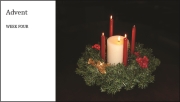 Next Sunday begins the final week of Advent, the week leading up to the primary celebration of our savior’s birth. Just as the angels heralded the arrival of God’s son so we are to announce the purpose of that coming and a warning to those without hope in God of the coming judgment.
Next Sunday begins the final week of Advent, the week leading up to the primary celebration of our savior’s birth. Just as the angels heralded the arrival of God’s son so we are to announce the purpose of that coming and a warning to those without hope in God of the coming judgment.
 Last year we published an article called “Are you Ready?” where we provided a couple biographies of well-known people and ways to bridge the conversation to Jesus. We heard from several readers how helpful this was so Think-Biblically.com has decided to make this an annual story.
Last year we published an article called “Are you Ready?” where we provided a couple biographies of well-known people and ways to bridge the conversation to Jesus. We heard from several readers how helpful this was so Think-Biblically.com has decided to make this an annual story.
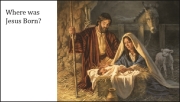 Debate has begun over the birthplace of Jesus. Due to the identification of a second city by the name of Bethlehem not far from Nazareth, some scholars have taken the position that Jesus was born not in Judea but in Galilee. “If Jesus were born in the City of David,” they argue, “why is he called the Nazarene?” Even early Christians were called Nazarenes and Christianity was known as the Nazarene Sect.
Debate has begun over the birthplace of Jesus. Due to the identification of a second city by the name of Bethlehem not far from Nazareth, some scholars have taken the position that Jesus was born not in Judea but in Galilee. “If Jesus were born in the City of David,” they argue, “why is he called the Nazarene?” Even early Christians were called Nazarenes and Christianity was known as the Nazarene Sect.
 Standing stones are important, but equally important are the words Jacob spoke about that place. He named it Beth-El. It is a compound word, “beth” (pronounced “bait” in Hebrew) meaning house, and “El” which was the common name for God. Together they mean “House of God” which to my way of thinking is odd. How can a place outside, in the wilderness, be a “house”? The answer is given by the wisest man who ever lived. Solomon asks himself “Will the Lord God dwell in a house built be the hands of men?” The place is unimportant; where the Lord dwells is his home. That can be in a wilderness, it can be in a pillar of fire by night and a cloud by day. It can be upon a golden ark or a temple adorned as no other. Home isn’t where you hang your hat; it’s where the presence of the Lord is!
Standing stones are important, but equally important are the words Jacob spoke about that place. He named it Beth-El. It is a compound word, “beth” (pronounced “bait” in Hebrew) meaning house, and “El” which was the common name for God. Together they mean “House of God” which to my way of thinking is odd. How can a place outside, in the wilderness, be a “house”? The answer is given by the wisest man who ever lived. Solomon asks himself “Will the Lord God dwell in a house built be the hands of men?” The place is unimportant; where the Lord dwells is his home. That can be in a wilderness, it can be in a pillar of fire by night and a cloud by day. It can be upon a golden ark or a temple adorned as no other. Home isn’t where you hang your hat; it’s where the presence of the Lord is!
